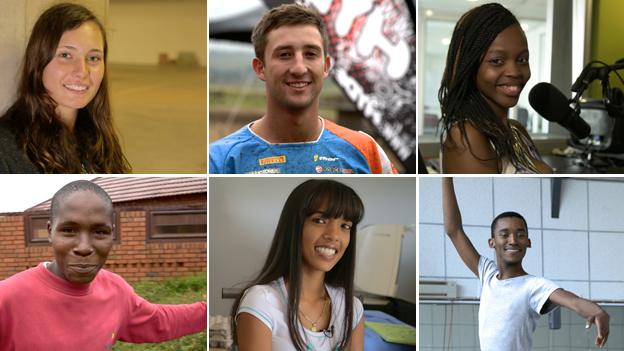South Africa's 'born-free' generation
- Published

South Africa's so-called "born-free" generation now accounts for some 40% of the population. Born since the country's first fully democratic elections in 1994, they have grown up without apartheid and the struggles of South Africa's older generation.
Here, six "born frees" talk about life growing up in the new South Africa.
Thabang Mabaso
Ballet dancer Thabang Mabaso grew up in Orange Farm, a poor township outside Johannesburg, before going to art school. There he started to train as a dancer and is now a professional dancer in the Johannesburg ballet company.
He gives ballet lessons in the townships and knows his life would have been very different under apartheid.
"If we hadn't gained democracy in 1994," he says, "I'd have been perhaps a gardener but definitely not a ballet dancer."
He readily acknowledges that few blacks attend his performances and adds that there has been opposition to his chosen profession closer to home.
"My mum never saw my ballet as a proper job or career, she would always say: 'Oh you're going to go play ballet now?'
However, Thabang believes that South Africa has the diversity and the potential to develop like the United States.
"I think we have similar histories and I believe that South Africa definitely could become like America."
Nisha Lutchman
Trainee nurse Nisha Lutchman runs a small novelty cake business with her sisters.
She lives with her family in a semi-rural location just outside Walkerville, south of Johannesburg, where violent robberies are a constant source of fear. Their house has been robbed so often that the TV is now in a cage bolted to the wall.
"I have heard from older people what it was like before 1994, how you had to carry your pass around with you to go to different areas but the crime was much less then," she says.
"I don't have freedom. I can't walk to the shops without taking off my jewellery. I passed my driving test but I have never driven on my own for security reasons," she says.
"Many things about South Africa are better now. I can be friends with whoever I want, I don't have to worry about what race they are. But crime is much worse than before. I just want it to be a safer place."
Tyron Miller
Tyron Miller is an up-and-coming motocross rider competing in national events. When he is not competing, he works for his father's ophthalmology business.
"I think for my parents' generation it was a really big change," he says of the end of white-minority rule.
"I am conscious that I am one of the first generation to be born free in South Africa but because of that I don't think about it," he says.
"I have only known this South Africa. I love it. No other country has the diversity that South Africa has. There is nowhere else I'd rather be."
Mahlatse Legodi
Mahlatse Legodi was jailed for four months for stealing a mobile phone and now is determined to set his life on the right track.
Living in the Pretoria township of Atteridgeville, he says he fell in with a bad crowd.
"I would hang around with my friends in the street and they would say: 'Do this,' and I would do it. I began stealing. There was no-one to say what was right or wrong."
He credits his uncle, a former prisoner who now runs an NGO (non-governmental organisation) rehabilitating offenders, with inspiring him to complete his education and turn his life around.
"My uncle has done a lot to help me realise what I can do if I go back to school. For me, freedom is the freedom to live a better life."
Khensani Khoza
Khensani Khoza, aka Ms Candy K, is a radio DJ who presents a show on VOW FM, a university radio station in Johannesburg.
A child of South Africa's new black middle class, she is a law student but has ambitions to become a star radio or TV presenter.
"I don't want to imagine if 1994 hadn't happened, but I can imagine it: I would not have been able to go to university, to study law," she says.
She believes the ANC government of the last 20 years should be given more time to make changes.
"I am one of those people who believes in giving my government time. It is very easy to criticise but I think people should remain optimistic and hope they can deliver on their promises."
Chanelle Olivier
Chanelle is one of the top female skateboarders in South Africa. Also a student, she has studied ballet as a hobby.
"I think the ballet helps with skateboarding, it's all about balance," she says.
But the world of competitive skating is a male-dominated one that she discovered almost by accident.
"A friend got me into playing skating games on the computer and then we started skating for real," she explains.
Chanelle says the skating community is close-knit and racially mixed,
"It's like a family. It's a small skating scene in South Africa and there's a sense of community, it's not really competitive like in some other countries."